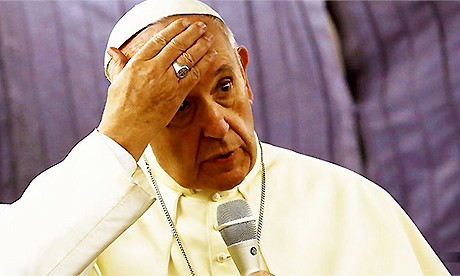The Chilean bishops announced their collective resignation last Friday following a series of sex abuse cases that have shaken the church.
But far from ending the crisis, the decision heralds the beginning of a long rebuilding process in which Pope Francis will have a free hand to choose their successors.
After their week in Rome, Chile’s bishops have now returned to their dioceses. Despite submitting their resignations to Pope Francis they will remain in their posts until these are accepted.
In a few cases, Rome’s decision will probably not take long. In others, Pope Francis will need time to consider and perhaps study the various files.
Meanwhile, as a result of the shock caused by Friday’s events, new sex abuse cases have already begun to emerge.
Over the weekend, a group of priests from Rancagua, south of Santiago, were accused of belonging to a vast network of abusers.
Bishop Alejandro Goic Karmelic of Rancagua reportedly first received these accusations 18 months ago. However, he took no action for lack of evidence despite presiding over the Chilean church commission responsible for fighting sexual abuse.
This weekend, he finally announced the suspension of 15 priests — nearly a quarter of the priests of the diocese!
Meanwhile, the collective resignation of the Chilean bishops will give Pope Francis a free hand to tackle the issues.
On Tuesday, he predicted that the problems “will not be solved simply by dealing with particular cases and reducing them to the dismissal of individuals.”
“That will be necessary, as I have clearly said, but it is not enough,” he said. “We need to go further.”
“It would be irresponsible on our part not to go deeper and look at the root of the problem and the structures that allowed these events to occur and perpetuate themselves,” he said.
He cited an “elitist psychology that ends up by generating dynamics of division, separation, ‘closed circles,’ leading to a narcissist and authoritarian spirituality,” the pope said.
This occurred to the extent that, as the victims themselves attested, the Chilean bishops did not hesitate to “dupe” the pope of the facts, leading him to side with them and repudiate victims.
It will take a long time for the Chilean Church to rebuild itself on a healthy basis. However, Francis wants the whole church involved including laypeople.
How are Vatican officials responding?
Cardinal Marc Ouellet, prefect of the Congregation for Bishops, was the only other Vatican official to take part in Pope Francis’ series of face to face meeting with the Chilean bishops.
Meanwhile, the rest of the Curia was kept at a distance from the matter, which personally implicated the pope. The Vatican continued to function normally throughout the week.
On Saturday, however, the coincidence between the announcement of the canonization of Archbishop Oscar Romero and the funeral of Colombian Cardinal Dario Castrillon Hoyos, who backed Rome’s takeover of the Latin American Church under Pope John Paul II, led some observers to raise questions as to whether it was opportune to take a fresh look at these events.
Another person involved here and who had close ties with Chile was Pope John Paul II’s secretary of state, Cardinal Angelo Sodano.
As nuncio in Santiago during the Pinochet dictatorship, Sodano helped fashion the current Chilean Church. Continue reading
- Image: Now the end begins
